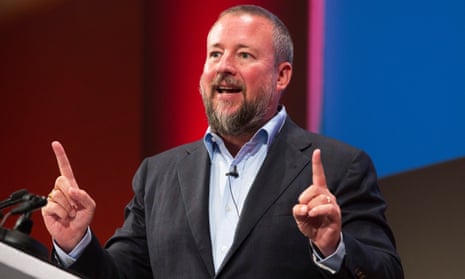Everyone at this year’s Edinburgh International Television Festival was expecting Vice chief executive Shane Smith to ruffle a few feathers when he gave the annual MacTaggart lecture on Wednesday evening, but few were prepared to be quite so ruffled.
In a rambling speech interrupted by references to drinking, drug taking, becoming director general of the BBC – and, at one point, a moth landing on his head – the boss of the digital media empire lambasted broadcasters for neglecting the interests and needs of the world’s youth.
The TV industry has been aware it has something of a youth problem for years, but Smith’s speech has pushed the issue centre stage. The hyperbolic, confrontational language he used has re-energised the debate, and many have taken umbrage at a North American upstart coming to Scotland to tell UK broadcasting it’s out of touch. It’s not hard to see why.
“Now the baby boomers have had a stranglehold on media and advertising for an entire generation,” he told the assembled producers, TV bosses and journalists at the Edinburgh Playhouse. “That stranglehold is finally being broken by a highly educated, ethnically diverse, global thinking, hard-to-reach generation. And media is having a hard time adapting to this rapid change.”
Topics such as climate change or LGBT issues that young people care about are covered rarely if at all, he said, because the people making TV are making it about the things that interest them. “It’s a different market and it consumes media in a different way. It can’t be advertised to traditionally and it wants media to be specific only to them. This is hard for baby boomers to get their heads around. You have a lot of baby boomer executives saying ‘I don’t know, put a skateboard in it’. There is no easy solution.
“Because of that it changed everything. Everyone said young people don’t care about news [and] they sure as hell don’t care about international [news]. Bullshit. They care. But they don’t like the way it’s been portrayed up until now. This is a huge white space.”

The following day the TV bosses of Britain’s biggest broadcasters got their chance to respond, and their central argument was that while Smith might be right about the US, the UK was a different kettle of fish. “In America, it still feels like making that content is really radical and revolutionary,” said BBC director of content Charlotte Moore. “Networks there do not show stuff about climate change, about women. It’s a good rallying cry ... but it shows us how precious what we have in the UK is.”
Sky’s managing director of content Gary Davey said Smith had missed the point. “We all have to acknowledge that we probably need to encourage more young people to be in the creative process,” he said. “But I think we’re already doing a lot of what he’s advocating .... We have a fantastic diversity of channel types and programme types ... It’s a fantastic breadth of choice. We are effectively servicing lots of target groups.”
Asked whether Smith was “a genuine disrupter or emperor’s new clothes”, ITV director of television Kevin Lygo was less diplomatic, saying he was “trying not to use the word ‘odious’”, and was met with a round of amused applause.
Channel 5’s director of programmes Ben Frow (who had skipped Smith’s speech altogether) made a telling intervention on the topic of sex on TV to justify a show that debuted at the start of the century. “Kids like sex and confrontation, and Big Brother has both.” And while Moore said it was patronising to say the young are only interested in sex, her list of shows that get the youth vote – including The Great British Bake Off, The Apprentice, and programmes about Brexit – did not suggest a revolutionary approach to the audience.
Jay Hunt, Channel 4’s chief creative officer, later added there was a danger of creating a “cult of youth” and “demonising” old people. “It’s OK to make shows for people over 34. We are at risk of over-correcting.”

Broadcasters here can point to their own successes and the UK’s diverse range of programming. Yet for all the pride in good shows dealing with important issues, the stats suggest young people are paying less and less attention to it. Ofcom’s Communications Market Report published earlier this month showed the average British person watches almost two-thirds of their video diet as live TV, and with recorded TV included that rises to almost 80%. Yet live viewing drops to little more than a third for 16- to 24-year-olds and less than half when recorded is thrown in. Almost 40% of their time is spent with free or paid on-demand video and, of course, short video clips of the kind you find on YouTube.
Research by Enders Analysis commissioned by former Channel 4 executive Liz Warner, who helped launch Big Brother, paints an even bleaker picture for the leading TV executives who gathered in Edinburgh. Enders found that the average age of viewers of BBC1 and BBC2 is 62, while on ITV it is 60 and on Channel 5 it is 58. On Channel 4, the average age is 55 and on “youth” channel E4, it dips to 42, which is also the average age of the UK population.
In her Bafta lecture last month, titled TV Is Old and Boring, Warner warned of a danger – losing a generation – remarkably similar to the one described by Smith. She said that TV was rehashing old ideas, failing to take risks and becoming a less appealing place for young people to work. “We have failed to engage with a whole generation of digital talent, the younger generation are not switching on, television is failing the young.” Unlike Smith, though, she wasn’t talking from a background of US television, but from a career firmly rooted in the UK. Her warning was stark. “It’s got beyond being anecdotal and I think we’re facing a creative chasm and a crisis.”
Smith’s message, and certainly Smith himself, may not have gone down well with his audience in Edinburgh. But he’s not the only one worried about whether TV is doing enough to make sure it offers a younger generation of viewers what they want.
Is the online-only BBC3 a success?

BBC3 remains central to the BBC’s attempts to reach young people despite going online only seven months ago, but a recent survey by Thinkbox showing the corporation has seen an 18% fall in its youth audience since the linear channel’s closure has raised questions about the move.
In the post-MacTaggart interview at the Edinburgh TV Festival Vice’s Shane Smith said closing the channel was a mistake.
“I don’t know I would have closed [BBC3] down. I think I would have waited a little bit. I know the [BBC’s] mandate is ‘we’ve got to get more millennials, get online’, but if you had an asset that’s that good, that’s beautiful.”
At Edinburgh, BBC3 unveiled three new commissions about the US that are the kind of shows Vice itself might make, including a documentary fronted by Angela Scanlon called Trump’s Youngest Superfans and a Reggie Yates programme on gun crime in Chicago.
BBC3 controller Damian Kavanagh told the festival that the short period covered by the survey meant people shouldn’t draw strong conclusions.
“It’s really dangerous to start measuring figures over a six-month period and extrapolate.”
Kavanagh also pointed out that BBC3 long-form content eventually airs on BBC1 and BBC2, and said Vice’s decision to go the other way and launch on TV was motivated by a desire to sell more ads. He also agreed with other executives at the festival that Smith’s criticism of TV’s approach to young people applied to the US but not the UK.
“I think we’ve been making stuff that cut through for young people, all the broadcasters are pretty good at it.”
